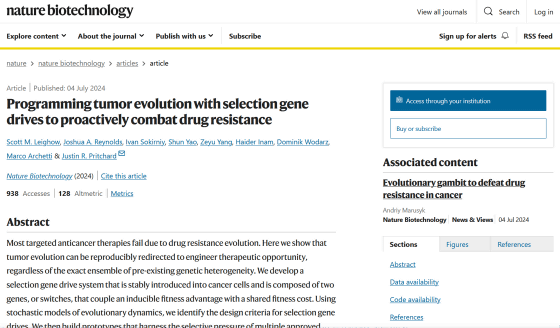An attempt to treat cancer by incorporating a 'self-destruct switch' into the genes of cancer cells to prevent them from acquiring resistance to anti-cancer drugs

Programming tumor evolution with selection gene drives to proactively combat drug resistance | Nature Biotechnology
https://www.nature.com/articles/s41587-024-02271-7

'I've never seen anything like this': Scientists hijack cancer genes to turn tumors against themselves | Live Science
https://www.livescience.com/health/lung-cancer/ive-never-seen-anything-like-this-scientists-hijack-cancer-genes-to-turn-tumors-against-themselves
Cancer cells can acquire resistance to anticancer drugs in various ways, such as by molecularly inactivating drugs or by avoiding apoptosis (cell death) . Since there is no point in treating a cancer cell with an anticancer drug that is no longer effective, if drug resistance is confirmed, it is necessary to find the next effective drug or another treatment method.
'So much time, effort, energy, money and heartbreak is spent trying to find the next version of a drug that will work on tumors, and no matter how good the drug is, it doesn't work in the long term,' said Scott Lahore of Pennsylvania State University.
Therefore, Rayho and his research team developed a new treatment called 'dual switch selection gene drive' that hacks the evolution of cancer cells to overcome anticancer drug resistance.
Dual switch selection gene drive incorporates a 'switch that grows larger than other cancer cell populations' and a 'switch that releases toxic substances that are harmful to cancer cells' into the genes of cancer cells. By switching the 'self-destruct switch' of gene-edited cancer cells on and off at the appropriate time, it is possible to kill the original cancer cells while preventing them from acquiring drug resistance.

To prove this idea, the team inserted two switch genes into
Normally, erlotinib stops the activation of the EGFR protein to prevent cancer cells from growing uncontrollably, but by turning on the first gene, the modified cancer cells can acquire resistance to erlotinib. By incorporating a self-destruct switch into the cancer cells and administering erlotinib, the research team was able to make the modified cancer cells grow faster than the original cancer cells, and then turn off the switch when the modified cancer cells became dominant, stopping their proliferation.
Once the proliferation of the dominant modified cancer cells has been stopped, the second self-destruct switch is turned on. This gene produces an enzyme that converts a harmless molecule called flucytosine (5-FC) into the anticancer drug fluorouracil (5-FU) . When the second switch is turned on and flucytosine is administered, fluorouracil is released, destroying both the modified cancer cells and normal cancer cells in one fell swoop.
The team actually tested this dual-switch selection gene drive in laboratory mice, and reported that about 20 days after the start of treatment, the modified cancer cells outgrew normal cancer cells, and after 80 days, the tumor volume was reduced to zero.

Rayho and his colleagues have launched a startup called Red Ace Bio to research and develop dual-switch selection gene drives, and are exploring how they can be applied to cancers other than lung cancer and other anticancer drugs.
'We envision the dual-switch selection gene drive having applications beyond lung cancer treatment. We see this as a generalizable platform for delivering therapeutic genes to cancer and using them to create therapeutic opportunities that could lead to future therapies,' said Rayho.
Related Posts:
in Science, Posted by log1h_ik







